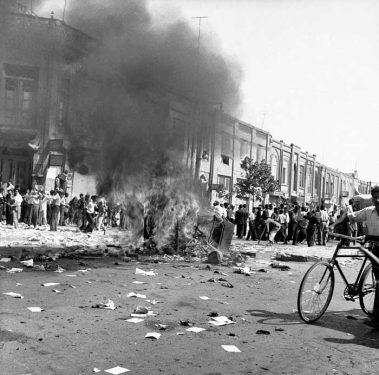An Immigration Story:
An Interview with Mr. A (Part 2)
Leaving your homeland and residing in another—with a totally new culture, language, and set of laws and regulations—is very challenging and requires a lot of adaptation that, in most cases, is also very frustrating.
But, looking back at those challenges many years later makes some of them look funny, some amazing, and some, of course, sad. The truth is, no matter how we feel about them, the challenges are, for sure, part of the history of immigration that needs to be documented for use by our grandchildren or simply by historians to picture the hardship that first-generation Iranians had to go through to meet those challenges.
Peyk kicked off this column in 2021 with Reza Khabazian’s story, with a goal to encourage our readers to start telling their stories so we can present a diverse documentary. Now that Mr. Khabazian has published his six-part story, it is time for new stories and new voices.
 Reza Khabazian (RK): Thank you, Mr. A, for sharing your immigration story with us. In the previous session, we learned that you and your wife were both members of a religious minority in Iran. Also, you both were employed by the government. You were employed by the Ministry of Justice and your wife was a schoolteacher. We also learned that before the revolution, when almost all government offices were on strike, your home was attacked by a group of religious fanatics in which your belongings were taken from your home and the house was set on fire in bright daylight while you were home and unable to confront them. This sad incident forced you to move to your uncle’s home until the house was repaired. Please continue, as painful as it is to remember those days, regarding what happened after that.
Reza Khabazian (RK): Thank you, Mr. A, for sharing your immigration story with us. In the previous session, we learned that you and your wife were both members of a religious minority in Iran. Also, you both were employed by the government. You were employed by the Ministry of Justice and your wife was a schoolteacher. We also learned that before the revolution, when almost all government offices were on strike, your home was attacked by a group of religious fanatics in which your belongings were taken from your home and the house was set on fire in bright daylight while you were home and unable to confront them. This sad incident forced you to move to your uncle’s home until the house was repaired. Please continue, as painful as it is to remember those days, regarding what happened after that.
Mr. A: Yes. I think I mentioned that my uncle was a wealthy businessman, and his house was in an upper-class neighborhood next to the police station. We all believed his house would be a safe place to move to.
RK: Was it really safe?
Mr. A: As a matter of fact, yes, it was. That’s why before nightfall on that terrible day, not only we but three other families had to escape their own homes and take refuge in his house.
RK: Were they going through the same dilemma as you were?
Mr. A: Yes.
RK: Where were the government forces? Couldn’t they do anything to stop the mobs?
Mr. A: Actually, the entire country was in chaos. It looked like No Man’s Land. Members of law enforcement agencies were just protecting their bases so the mobs couldn’t get their hands on weapons. If it wasn’t for martial law, the looting would have continued during the nights, too.
RK: Please tell us about the mood at your uncle’s home.
Mr. A: The entire house was under a heavy cloud of sadness. Men were just looking at each other in disbelief, women were all wiping their tears in silence, and the kids were just staring at their moms wondering what was going on. My uncle was constantly on the phone calling authorities asking them to stop these atrocities. He even called the influential religious leaders asking them to say something, at least denounce these actions and call on the mobs to stop.
RK: Did they do anything?
Mr. A: After three whole days, they finally prepared a religious order and had it be announced on radios and televisions.
RK: Why after three days?
Mr. A: Your guess is as good as mine. I believe if we were the aggressors, they wouldn’t wait even one minute.
RK: Was it effective? Did it stop?
Mr. A: Yes, it did. But the damage was already done to many poor families. Both monetary and emotional damage. In my own case, however, my uncle comforted us a great deal by helping to repair the fire damage and replacing the stolen goods, but the incident left me and my wife with a deep emotional scar. Imagine that you work hard to put a roof over your head and then, one day, you lose everything and almost become homeless. This incident also made a fundamental change in the attitude of my family. Before the incident, I was regarded as a pessimist and my wife had an opposite view. But, the mental status of my wife, after the incident, started to go toward having a feeling of anxiety and depression that never left our home.
RK: Could you give us an example please?
Mr. A: Any loud conversation in public, loud sounds like telephone rings, or someone rushing toward us used to make her very nervous and agitated. Therefore, to calm her down, I had to pretend like an optimistic person while she was no longer an optimist.
RK: How long did you stay at your uncle’s house?
Mr. A: It was almost two months. Finally, when the house was getting ready for us to move back, I remember one night at the dinner table, my wife suddenly announced that she was not willing to move back to our house. The announcement took all of us by surprise. My uncle looked at me and saw the surprise in my face and asked her the reason why?
I have such a bad memory from the house and that neighborhood, she said with a heavy voice.
But my Dear!, my uncle continued, first, the house is totally renovated and, secondly, it was not the fault of your neighbors. You are living in a good neighborhood. You need to remember that those kinds of looters can be anywhere at any time.
I know, she replied, but now, the looters know exactly where we live and can return at any time. I really don’t feel safe there anymore.
In that case, why don’t you either rent the house or even sell it. You are more than welcome to live here with us as long as you like!
No, she replied quickly, we have been enough of a burden already. Why don’t we sell the house and rent a place? If the social situation improves, which I don’t think it will, we can buy a better house in a better neighborhood.
If this makes her happy, I told my uncle honestly, I have no problem with that.
RK: Did you sell the house?
Mr. A: No. The events were going so rapidly in Iran that before we knew it, revolution succeeded, and the regime changed. We were living at my uncle’s house when it happened. People poured into the streets and you could hear cars honking, people hugging each other, some were crying of joy, some offering people with sweets.
RK: What about you guys? How did you guys feel?
Mr. A: We were sitting at home in awe, wondering that now that the looters’ mentality became the dominant one, what would happen to us. One thing was clear and it was that the country was going through a fundamental change and no one could predict the future, at least for the life of all religious minorities.
RK: Now that you are looking back at the events following the revolution, do you believe the lives of all religious minorities changed for better or for worse?
Mr. A: I am not sure about the lives of other religious minorities but, as far as our lives, it changed drastically for the worse. For a few months after the revolution, the new government was dealing with several significant issues related to the influential people of the old regime on top of its effort to grasp power. During those times, a simple mind could conclude that things were going back to normal for those who had not been a part of the old regime. On one hand, all daily papers were overloaded with the news of executions of old military generals, ministers, and so on—and, on the other hand, stores were opening and government offices were going back to a normal life; that is, until a major incident took place.
RK: What was that?
Mr. A: First, the assets of my uncle were confiscated and he got imprisoned. That was a huge shock to our family.
RK: Could you please explain the reason for his imprisonment?
Mr. A: They were going after all wealthy and influential people who were not part of their team. But, in the case of my uncle, the government claimed that he was accused of being a spy for the government of Israel. They used his passport information that showed he had made a trip to Israel in the past. Any explanation that the purpose of the trip was visiting our religious sites in Israel did not change the accusation. A second shock followed the first one not too long later.
RK: What was that?
Mr. A: One day, I was called to the office of my supervisor. I felt a butterfly in my stomach that something wrong was going to happen. As I entered his office, he asked me to close the door and offered me to take a chair and sit down.
- Mr. A, I am sure you realize that due to revolution and change of regime, so many fundamental changes will affect the lives of many people. I always have been very happy to have you in our team and I am willing to do everything I can to keep you here. But, according to the government order, the people with your religious beliefs should be expelled from all government entities.
- You mean, I am getting terminated?
- Unfortunately, yes. But, not to worry, I have found a way that if you agree, we can keep you employed.
- What is that?
- Mr. A, why don’t you denounce your religion?
- What?
- It is only on the paper. Just to show them you are converting to Islam. Of course, you can keep practicing your religion at home. This is only on the surface.
- Allow me to ask you a question now?
- Please, go ahead.
- If you were facing the exact situation, would you do it?
- Yes…. yes….yes. In a heartbeat. You know why?
- No.
- To feed my family. To survive! And you need to do it, too, Mr. A.
- I never thought that one day I would face such a choice. But now that you brought it up, I should say my beliefs are part of my identity, part of my family’s tradition. I really appreciate your concern and your sincere effort to help me. But, I can’t accept your offer.
- You are making a big mistake, Mr. A.
- You may be correct. But this is my final answer.
- Ok. In that case get your stuff, clean your desk, and I wish you luck.
As I exited the building, I decided to walk around the block, thinking about a way to bring the news to my wife—wondering how a brittle, depressed young woman could handle such terrible news. Life was going on all around me, pedestrians rushing to get to their destinations, some happily laughing, some with thoughtful faces, young boys offering pedestrians the daily paper while shouting: “list of more executions from last night!”
I finally got home to wait for the evening when my wife would come home from school. As I entered the house, I realized that she was already at home. I saw her in a corner, sitting with her head down, crying while my uncle’s wife gently patted her.
She had a piece of paper in her hand. There was no need for explanation. Now, we both were unemployed.
Mr. A’s story will be continued in the next issue.


















